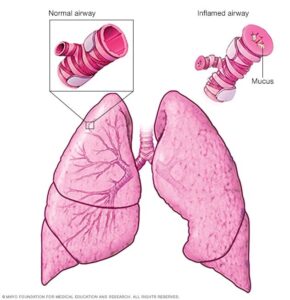Understanding the Complexity of Asthma

Understanding the Complexity of Asthma
Dr. Claire Arcidiacono, ND
As I mentioned in my prior blog today I will be talking about a well-known respiratory condition. That condition is Asthma. Let’s take the time to go over just how common it is, shall we? Approximately 7.7% of Americans have asthma. That amounts to about 24.9 million Americans. Of those approximately 20.2 million are adults and 4.6 million are children. Asthma appears to be more prevalent in females. (1)
But what exactly is asthma? When you have asthma your airways become swollen and the pathway for air to travel comes narrow. There may be extra mucus in the airway. As you can probably guess this narrowing of the air passageway can make breathing difficult. Please see the attached picture for a side by side comparisons between a normal airway and in inflamed asthmatic airway. (2)

While symptoms of asthma can vary from person to person there are some common symptoms you can experience. These include shortness of breath, wheezing when exhaling and coughing/ wheezing attacks that can be made worse when you have a virus. Other symptoms can include chest tightness or pain. There may be trouble sleeping due to shortness of breath and coughing. Symptoms of asthma may flare up due to exercise, occupational irritants and by allergens such as pollen or pet dander. I would also like to point out that while some people have symptoms only under certain conditions such as during physical exercise others will have symptoms all the time. (2)
While the cause of asthma is unknown we do know what the most common risk factors for asthma include. One major risk factor for developing asthma is a family history. Having a family history of asthma can make up to 6X more susceptible to asthma. Children and adults that are overweight or obese are also at an increased risk for asthma. People who have a history of smoking or were exposed to 2nd hand smoke are also at risk. Certain allergies such as eczema and hay fever seem to be risk factors for developing asthma. Certain viral infections can increase the risk of asthma. Both air pollution as well as work place exposers are risk factors as well. (3) Asthma symptoms may be triggered by cold air. Certain medications such as beta blockers and aspirin may trigger asthma symptoms. Gastroesophageal reflux (GERD) may also trigger asthma symptoms. Strong emotions, stress and even being in the cold can all trigger asthma symptoms. Even certain preservatives may trigger asthma symptoms. (1)
While some people may not consider asthma to be “series” I want to emphasize that yes asthma can have some series complications. In fact each year more than 3,500 people die from asthma. And in fact approximately 60% of adults and 44$ of children with asthma have poor control over their illness. (1) Complications from asthma can also include a permanent narrowing of the bronchial tubes which can affect how you breathe. Flare-ups can also lead to missed school or work and even interfere with activities of daily living such as sleep. There may also be side effects from long term use of medications used to treat asthma. Lastly asthma can lead to fatigue and even poor mental health. (4)
Asthma is treatable. While it is important to follow your doctors treatment plan there are things you can do to help improve your respiratory health.
- Elimination diets are a great way to determine if something you are eating is making your asthma flare up. It is well known that certain preservatives can trigger asthma. By doing an elimination diet you eliminate these preservatives and thus can determine if doing so helps your control over your asthma. (5)
- NAC is one of those supplements that comes up quite frequently. Studies have found that NAC is potentially anti-asthmatic. (6) In other words NAC is found to help stabilize the lungs when you have asthma. NAC has also been helpful in reducing mucus formation which as I mentioned in asthma there may be excess mucus. (7) Please see Invite’s NAC and our Detox Hx as well as the Daily Detox Powder!
- Quercetin has been found in studies to be protective against asthma symptoms. It has also been found to help protect against airway fibrosis. (8) Please see Invite’s Quercetin formula!
- Magnesium! I bet you’re saying magnesium again Dr. Claire? Well magnesium is going to pop up a lot in my different blog series. It’s just one of those things that seems to do everything. Magnesium has been found in studies to help reduce symptoms of asthma and even help to improve lung volume. Interestingly enough those with more severe symptoms appeared to benefit the most. (9) Please see Invite’s extensive line of magnesium products!
- Vitamin D has been shown in studies to help reduce asthma symptoms! (10) Please See Invite’s Immunity Hx (this was the product highlight I did not long ago!) as well as Invite’s extensive line of Vitamin D!
- Black Seed will be the next product highlight! Look for that blog soon!
Sources:
- https://acaai.org/asthma/asthma-101/facts-stats/
- https://www.mayoclinic.org/diseases-conditions/asthma/symptoms-causes/syc-20369653
- https://www.lung.org/lung-health-diseases/lung-disease-lookup/asthma/learn-about-asthma/what-causes-asthma
- https://www.healthdirect.gov.au/asthma
- https://www.webmd.com/asthma/food-allergies-and-asthma
- https://bjbas.springeropen.com/articles/10.1186/s43088-021-00188-7#:~:text=Conclusions,eosinophil%20infiltration%2C%20and%20oxidative%20stress.
- https://clinicaltrials.ucsf.edu/trial/NCT03822637#:~:text=Historically%2C%20studies%20of%20mucolytics%2C%20like,those%20with%20significant%20mucus%20impaction.
- https://karger.com/pha/article-abstract/108/5/432/853230/Quercetin-Alleviates-Asthma-Induced-Airway?redirectedFrom=fulltext
- https://www.ncbi.nlm.nih.gov/pmc/articles/PMC9543098/#:~:text=in%201990%20studied%20the%20bronchodilating,signs%20and%20symptoms%20%5B7%5D.
- https://www.ncbi.nlm.nih.gov/pmc/articles/PMC8389855/
